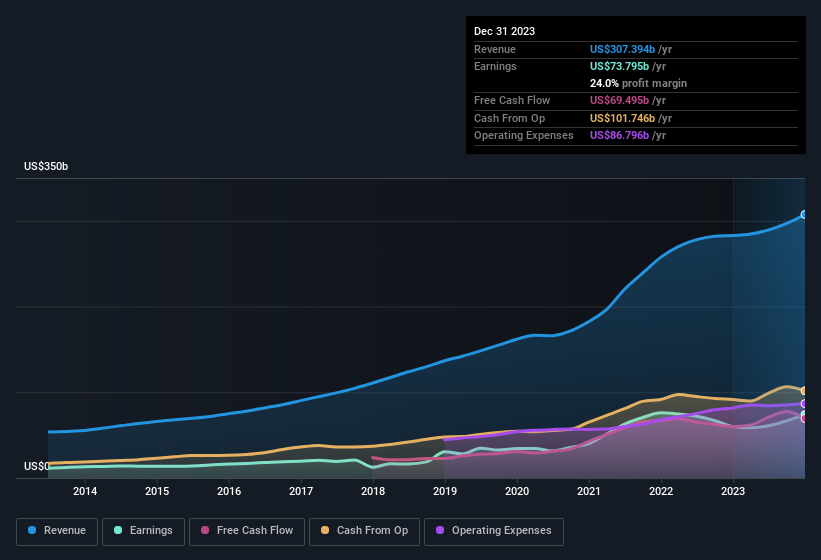For beginners, it can seem like a good idea (and an exciting prospect) to buy a company that tells a good story to investors, even if it currently lacks a track record of revenue and profit. But the reality is that when a company loses money each year, for long enough, its investors will usually take their share of those losses. A loss-making company is yet to prove itself with profit, and eventually the inflow of external capital may dry up.
If this kind of company isn’t your style, you like companies that generate revenue, and even earn profits, then you may well be interested in Alphabet (NASDAQ:GOOGL). While this doesn’t necessarily speak to whether it’s undervalued, the profitability of the business is enough to warrant some appreciation – especially if its growing.
See our latest analysis for Alphabet
Alphabet’s Earnings Per Share Are Growing
The market is a voting machine in the short term, but a weighing machine in the long term, so you’d expect share price to follow earnings per share (EPS) outcomes eventually. Therefore, there are plenty of investors who like to buy shares in companies that are growing EPS. It certainly is nice to see that Alphabet has managed to grow EPS by 26% per year over three years. If the company can sustain that sort of growth, we’d expect shareholders to come away satisfied.
Careful consideration of revenue growth and earnings before interest and taxation (EBIT) margins can help inform a view on the sustainability of the recent profit growth. The music to the ears of Alphabet shareholders is that EBIT margins have grown from 26% to 29% in the last 12 months and revenues are on an upwards trend as well. Ticking those two boxes is a good sign of growth, in our book.
In the chart below, you can see how the company has grown earnings and revenue, over time. For finer detail, click on the image.
The trick, as an investor, is to find companies that are going to perform well in the future, not just in the past. While crystal balls don’t exist, you can check our visualization of consensus analyst forecasts for Alphabet’s future EPS 100% free.
Are Alphabet Insiders Aligned With All Shareholders?
Owing to the size of Alphabet, we wouldn’t expect insiders to hold a significant proportion of the company. But we are reassured by the fact they have invested in the company. We note that their impressive stake in the company is worth US$194b. This suggests that leadership will be very mindful of shareholders’ interests when making decisions!
Is Alphabet Worth Keeping An Eye On?
You can’t deny that Alphabet has grown its earnings per share at a very impressive rate. That’s attractive. This EPS growth rate is something the company should be proud of, and so it’s no surprise that insiders are holding on to a considerable chunk of shares. The growth and insider confidence is looked upon well and so it’s worthwhile to investigate further with a view to discern the stock’s true value. Of course, just because Alphabet is growing does not mean it is undervalued. If you’re wondering about the valuation, check out this gauge of its price-to-earnings ratio, as compared to its industry.
While opting for stocks without growing earnings and absent insider buying can yield results, for investors valuing these key metrics, here is a carefully selected list of companies in the US with promising growth potential and insider confidence.
Please note the insider transactions discussed in this article refer to reportable transactions in the relevant jurisdiction.
Have feedback on this article? Concerned about the content? Get in touch with us directly. Alternatively, email editorial-team (at) simplywallst.com.
This article by Simply Wall St is general in nature. We provide commentary based on historical data and analyst forecasts only using an unbiased methodology and our articles are not intended to be financial advice. It does not constitute a recommendation to buy or sell any stock, and does not take account of your objectives, or your financial situation. We aim to bring you long-term focused analysis driven by fundamental data. Note that our analysis may not factor in the latest price-sensitive company announcements or qualitative material. Simply Wall St has no position in any stocks mentioned.


